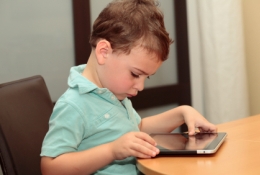05 August 2013
 The University of South Australia will lead a national trial under the NBN-Enabled Education and Skills Services Program to develop technology enhanced learning modules designed to improve education for young people with disabilities and improve their chances of employment.
The University of South Australia will lead a national trial under the NBN-Enabled Education and Skills Services Program to develop technology enhanced learning modules designed to improve education for young people with disabilities and improve their chances of employment.
With funding support of $2.97 million from the Australian Government through the Department of Education, Employment and Workplace Relations (DEEWR), the project, Digital Enterprise: Pathways to Education and Employment for Young People with Disabilities, will make use of National Broadband Network connected sites in South Australia, Victoria, the Northern Territory and New South Wales.
Project leader, UniSA’s Associate Professor Denise Wood, says the project will develop an important model for education and employment training for thousands of marginalised people who are now missing out.
“Australians with disabilities have some of the lowest rates of participation in the workforce at 54 per cent compared to 83 per cent for people without disabilities,” Assoc Prof Wood says.
“Within that group, people with Autism Spectrum Disorders (ASD) have some of the worst education and employment outcomes of all and the number of people presenting with ASD appears to be on the rise, so there is a real need to develop educational supports that develop social skills, reduce isolation and work with young people's existing interests.
“This project will achieve these aims by harnessing the technology interests of high functioning young people with Autism as well as young people with a range of other disabilities including Acquired Brain Injuries.”
Through the deployment of a program called The Lab (www.thelab.org.au) and an entrepreneurship training program, which aims to deliver an accredited online Certificate IV in New Venture Creation to prepare the older participants for work as well as the possibility of developing a small business, the project aims to build the confidence and skills in young people with a disability, while also providing them with the tools to make their way in the world, to read, to connect, understand, create and imagine new opportunities.
The project team including Prof Noel Lindsay, Director of the Entrepreneurship, Commercialisation and Innovation Centre at the University of Adelaide, Dr Stefan Schutt, Victoria University and Dr Pammi Raghavendra, Flinders University will undertake the research in collaboration with the Australian Skills Development Institute, the South Australian Government Office for Youth, Brain Injury Australia, Autism SA, Novita Children’s Services, the Southern Mental Health, Child and Adolescent Mental Health Service, the Young and Well Cooperative Research Centre and Uniting Communities.
It will take groups of 12 young people in two categories – the transiting years from primary to secondary school (ages 11- 14) and then from school to work (aged 15+) – and provide technology-mediated education activities and teaching. The work will be carried out in specially designed high tech spaces connected to the NBN. In each location about 48 young people will be part of the pilot.
“We are drawing on a wide range of research from Australia and internationally to use 3D simulated environments, online lessons and media creation to support improved learning in the groups,” Assoc Prof Wood says.
"If the pilot proves successful we hope to expand this work and using what we have learned through our research to perfect the model so that it can be rolled out and provide more opportunities for young people with disabilities to participate in work and life.”
Media contact: Michèle Nardelli office: 08 8302 0966 mobile: 0418 823 673 email: Michele.nardelli@unisa.edu.au



